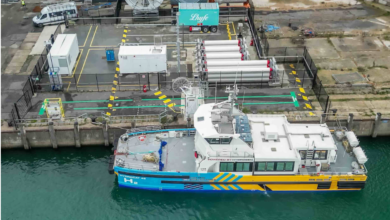Australian and the Netherlands ports test the waters for hydrogen

Seaports are the backbone of the global economy, as most goods are traded through waterborne transport. Given the growing hydrogen economy, ports are coming forward to prepare for the coming change. Shipping hydrogen by using ports require special handling infrastructure, which has to be in place for smooth and safe transportation. The ports can play a bigger role by employing their technological and logistical resources to produce green hydrogen.
This week, a few ports announce their plans to involve in the hydrogen value chain. Port of Acu has partnered with Australia’s Fortescue as H2Bulletin covers the news separately.
In Australia, Port Anthony Renewables has also signed a binding JV agreement with GrapheneX Pty Ltd to develop a hydrogen export facility at its port in Victoria. The proposed Victorian Hydrogen Export Hub (VH2Ex), once completed, would be able to store 100 tonnes /day hydrogen. The hydrogen will be supplied to local consumption as well as exports. This year, the port authority also partnered with Pure Hydrogen and Patriot Hydrogen to construct two separate hydrogen generation plants at the port. Previously it also joined a consortium with Swinburne University to develop a green hydrogen supply chain.
Meanwhile, On Tuesday (16th March), Port of Amsterdam, Evos, Electriq Global, Hydrogenious, and Hysilabs started an initiative called ‘H2Gate’ to conduct a feasibility study on how to import and store hydrogen on an industrial scale.
The H2Gate partners will look into various aspects of the hydrogen value chain from importing to storage with a throughput of one million tonnes/year hydrogen. The port has already been a regional hub for various other energy products. The partners will address various compressions, cooling and different carrier technologies, which may involve further studies and pilot projects.
